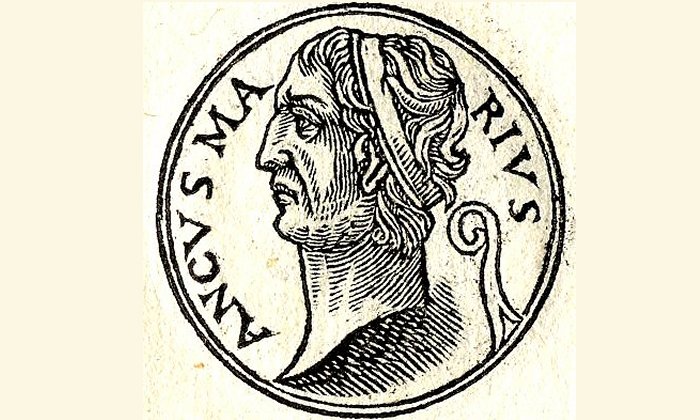Ancus Marcius: Semi-Legendary Fourth King Of Rome Obliged To Make War To Defend And Expend Territories
David Tee - AncientPages.com - Ancus Marcius, (677 to 617 BC), was the descendant of a man who was a good friend to Rome’s second and beloved King Numa Pompilius. It is said that his mother was a direct descendant and that Ancus was actually the grandson of Numa Pompilius.
Ancus Martius was the fourth of the Kings of Rome. Image credit: Guillaume Rouille (1518?-1589) - Public Domain
It was this connection that helped get Ancus Marcius elected as the fourth Roman king after the demise of Tullus Hostilius. Learning from the mistakes of his immediate predecessor, Ancus restored the religious practices of his grandfather and followed them intently.
Ancus Marcius - A Weak King
It was his first act as the new regent of Rome that established Marcius’ reputation. He had the Pontifex Maximus copy the religious texts of his grandfather, Numa Pompilius, and display those texts publicly so that no one would forget them or follow their instructions incorrectly.
Yet, it was his religious reputation that did not bring peace to his kingdom. Ancus Marcius was seen as a weak king because of his religious practices. This led his enemies to continually attack Roman land.
Ancus did not back down and did not take the theft of his land lightly. What he did do was follow the religious instructions on how to start a war. He is the first Roman king to go to war or even declare war according to the rites of the priests of ancient Rome, fetials.
After the defeat of the Latins in his first campaign, he brought the vanquished people into Rome as per Roman customs and made them citizens of the cities.
Ancus Marcius And His Accomplishments In Rome
Being victorious in war was not Ancus’ only accomplishment. When he brought the Janiculum into the city, he fortified the area with a wall. Plus, he built the first bridge, the Pons Sublicius, over the Tiber River to make sure that are was connected to the main part of Rome.
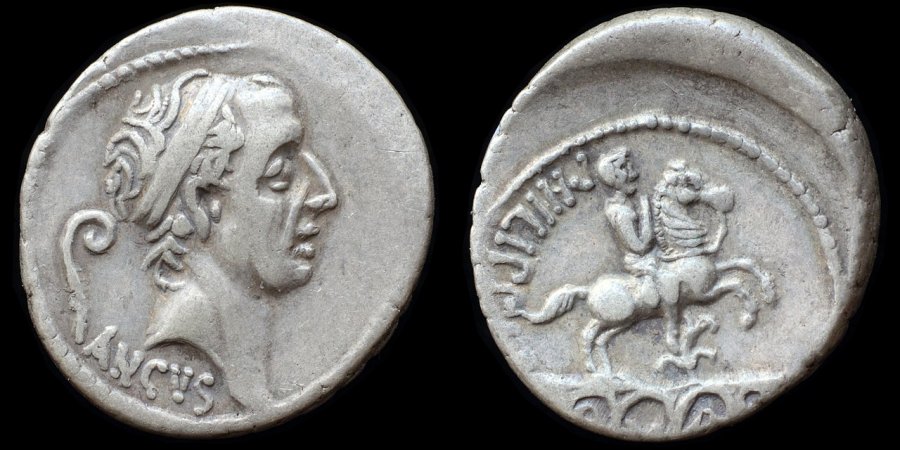 Silver denarius struck by Lucius Marcius Philippus in Rome 56 BC. source
Silver denarius struck by Lucius Marcius Philippus in Rome 56 BC. source
Marcius also took time to build the Fossa Quiritium, this was a ditch fortification to help protect the city from any eventual attack. Unfortunately, Rome was growing larger under his rule. This meant that Marcius had to deal with the rising crime rate.
This issue led him to build the first Roman prison called the Mamertine prison. Rome did not remain a small territory under Marcius’ reign. The king was able to expand its territorial holding by conquering the region surrounding Ostia.
There is some debate as to whether he actually founded the port or not, but his taking of the territory has been confirmed. His territorial land grab continued as he eventually captured the Silva Maesia a forest north of the Tiber River. He took the land from the Veientes.
Finally, he took the time to expand the temple of Jupiter Feretrius. This expansion work was done in honor of his territorial gains. In comparison, Ancus Marcius’ rule was broader and better than his predecessor Tullus Hostilius’s rule. Although the former had to battle a rising crime rate, the latter did not have to contend with it.
Ancus Marcius’ Legacy
By the time Marcius died in 616 BC he had a lot of accomplishments to his name. Although he did not start the wars he fought, he somehow came out the victor each time. His religious beliefs gave him the appearance of weakness and his enemies tried to take advantage of that perceived vulnerability.
Marcius’ time as king was not spent in warfare like his immediate predecessor, Tullis Hostilius. While he waged war, he still had ample time to improve the city, its defenses and enlarged its citizenry.
His biggest blot on his record is the fact that he seemed powerless to stop the growing crime rate. History does not record which of the many different people that occupied the city were to blame for the crimes committed.
All history says on the subject is that Marcius had to build the first prison to deal with the issue. In spite of this, he ushered in a golden age of religion that was to last through his next two successors at least.
Marcius died in 616 BC at the age of 60. His death came from natural causes which cannot be said of his successor Lucius Tarquinius Priscus. The latter was assassinated by the sons of the former.
Written by – David Tee AncientPages.com Staff Writer
Copyright © AncientPages.com All rights reserved. This material may not be published, broadcast, rewritten or redistributed in whole or part without the express written permission of AncientPages.com
Expand for referencesReferences:
Hooke N. The Roman history, from the building of Rome to the ruin of the commonwealth
Un album royal : Égérie et Numa
Beard M. A History of Ancient Rome
More From Ancient Pages
-
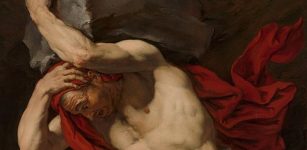 Why Did God Zeus Give King Sisyphus An Eternal Punishment?
Featured Stories | Sep 2, 2019
Why Did God Zeus Give King Sisyphus An Eternal Punishment?
Featured Stories | Sep 2, 2019 -
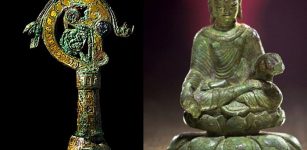 The Helgö Treasure: Bronze Buddha Statue, Coptic Scoop And A Crozier Depicting Biblical Tale Of Jonah
Artifacts | Mar 10, 2023
The Helgö Treasure: Bronze Buddha Statue, Coptic Scoop And A Crozier Depicting Biblical Tale Of Jonah
Artifacts | Mar 10, 2023 -
 Mystery Of Monte d’Accoddi: Was It An Ancient Step Pyramid, Altar Or Astronomical Observatory?
Civilizations | May 17, 2016
Mystery Of Monte d’Accoddi: Was It An Ancient Step Pyramid, Altar Or Astronomical Observatory?
Civilizations | May 17, 2016 -
 Did Ancient Civilizations Possess Knowledge Of Time Travel?
Ancient Technology | Sep 17, 2018
Did Ancient Civilizations Possess Knowledge Of Time Travel?
Ancient Technology | Sep 17, 2018 -
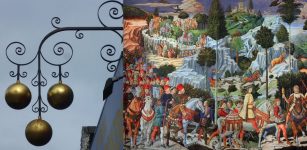 Why Is The Three Golden Balls Symbol For A Pawn Shop Connected To The Medici Family?
Ancient History Facts | Feb 12, 2019
Why Is The Three Golden Balls Symbol For A Pawn Shop Connected To The Medici Family?
Ancient History Facts | Feb 12, 2019 -
 Mysterious Advanced Underground Civilization And A Secret Society – Astonishing Discovery And Connection – Part 1
Ancient Mysteries | Apr 21, 2018
Mysterious Advanced Underground Civilization And A Secret Society – Astonishing Discovery And Connection – Part 1
Ancient Mysteries | Apr 21, 2018 -
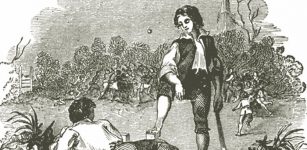 Ancient Irish Games Hurling And Curling Were Forbidden In 1366 By The Englishmen
Ancient History Facts | Jul 23, 2016
Ancient Irish Games Hurling And Curling Were Forbidden In 1366 By The Englishmen
Ancient History Facts | Jul 23, 2016 -
 12,000-Year-Old Rock Art In North America – Dating Petroglyphs In The American West
Archaeology | Mar 4, 2022
12,000-Year-Old Rock Art In North America – Dating Petroglyphs In The American West
Archaeology | Mar 4, 2022 -
 Did Ancient Oshoro Stone Circle Serve As A Portal To The Spirit World?
Featured Stories | Aug 19, 2017
Did Ancient Oshoro Stone Circle Serve As A Portal To The Spirit World?
Featured Stories | Aug 19, 2017 -
 Great Viking Fortresses Built By King Harald Bluetooth
Featured Stories | Dec 12, 2022
Great Viking Fortresses Built By King Harald Bluetooth
Featured Stories | Dec 12, 2022 -
 Thor: Brave And Mighty Thunder God In Norse Mythology
Featured Stories | Nov 7, 2016
Thor: Brave And Mighty Thunder God In Norse Mythology
Featured Stories | Nov 7, 2016 -
 Author’s Encounter With A Mysterious Not Of This World Entity Inside Callixtus Catacombs
Featured Stories | Apr 5, 2020
Author’s Encounter With A Mysterious Not Of This World Entity Inside Callixtus Catacombs
Featured Stories | Apr 5, 2020 -
 35,000 Unique Artifacts Discovered In 720-Year-Old Iroquoian Village In Canada
Archaeology | Oct 24, 2020
35,000 Unique Artifacts Discovered In 720-Year-Old Iroquoian Village In Canada
Archaeology | Oct 24, 2020 -
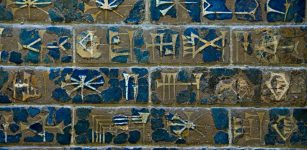 Ishtar Gate, The Eighth Gate Of The Inner City Of Babylon
Civilizations | Sep 6, 2015
Ishtar Gate, The Eighth Gate Of The Inner City Of Babylon
Civilizations | Sep 6, 2015 -
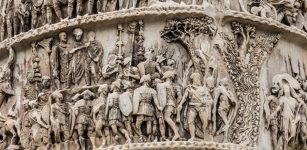 Impressive Column Of Emperor Marcus Aurelius – War Monument From Ancient Rome
Featured Stories | Jul 6, 2017
Impressive Column Of Emperor Marcus Aurelius – War Monument From Ancient Rome
Featured Stories | Jul 6, 2017 -
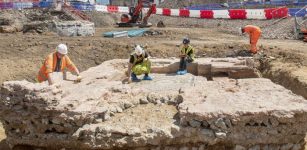 ‘Incredibly Rare’ Roman Tomb Unearthed Near London Bridge Station
Archaeology | Jun 13, 2023
‘Incredibly Rare’ Roman Tomb Unearthed Near London Bridge Station
Archaeology | Jun 13, 2023 -
 Mythical Submerged City Of Ys – Europe’s Own Sodom And Gomorrah
Featured Stories | Feb 1, 2023
Mythical Submerged City Of Ys – Europe’s Own Sodom And Gomorrah
Featured Stories | Feb 1, 2023 -
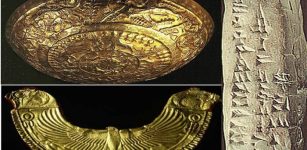 Forgotten Ancient Ugarit: One Of The Flourishing And Oldest Cities Of Canaan
Featured Stories | Jun 15, 2023
Forgotten Ancient Ugarit: One Of The Flourishing And Oldest Cities Of Canaan
Featured Stories | Jun 15, 2023 -
 Mystery Of Doppelgangers And Spirit Doubles – From Ancient To Modern Times
Featured Stories | Feb 28, 2022
Mystery Of Doppelgangers And Spirit Doubles – From Ancient To Modern Times
Featured Stories | Feb 28, 2022 -
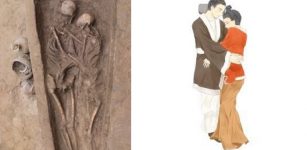 1,500-Year-Old Joint Burial Offers A Look Into Attitudes Toward Love And The Afterlife
Archaeology | Sep 14, 2021
1,500-Year-Old Joint Burial Offers A Look Into Attitudes Toward Love And The Afterlife
Archaeology | Sep 14, 2021

